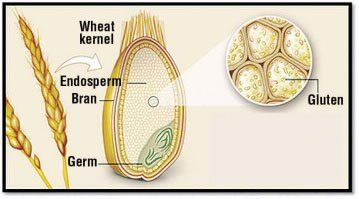Did you know that an undiagnosed gluten sensitivity
can manifest solely as a neurological disorder?
PASS THE BREAD?
Maybe
pass on the bread, pasta, and cereal ... as in:
don't eat it! at least until you are screened for gluten sensitivity by a skilled medical provider—especially if you are experiencing neurological impairments.
Researchers are showing that
gluten has a significant role in some forms of neurological dysfunction—from cerebellar ataxia, dementia, neuropathy, to epilepsy.
A MORE UPDATED PERSPECTIVE & DEFINITION OF GLUTEN
A more complete definition of gluten follows: Gluten is
a mixture of proteins, and is found in
all grains. It is comprised of
prolamines and glutelins. The
prolamine gliadin is the most common studied and researched component of gluten
because it is related to Celiac Disease. There are actually thousands of types of "glutens." In this perspective, there is no such thing as a truly "gluten-free" grain (Gluten Free Society).
- Even rice still contains a low percentage of gluten (5%)
- Oats contain 16%
- Corn contains 55% gluten from the prolamine called zien
That's right: corn is second only to
wheat
in its gluten protein content. A true gluten-free diet would actually eliminate all grains. To many, that sounds extreme, and that's why having an accurate diagnosis from a provider who truly understands gluten is absolutely essential.
BRAIN GUT CONNECTION?
While many may think of a gluten intolerance or sensitivity as something that would cause digestive problems, research is showing that the tasty, pasty gliadin and glutenin proteins as well as prolamines (which we have learned there are actually thousands of) that make up gluten can in fact contribute to
significant neurological impairments in those who are not just allergic (with a Celiac Disease diagnosis ) but even those who are intolerant or just sensitive to gluten - meaning they have symptoms but not a Celiac diagnosis (see below). The interesting part is, some of these patients do not present with gastrointestinal symptoms at all, only neurological symptoms.
This information has been present in the research since the 1960s, but is only recently beginning to be looked at more in depth and making its way into clinical practice.
“Recent studies are showing that gluten sensitivity may be much more common than previously thought. It may, in fact, be a separate disease entity that involves different organs and different mechanisms than celiac disease. While there is no doubt that the condition exists, the lack of definite criteria for a diagnosis has resulted in a skeptical attitude on the part of many doctors.”
– Dr. Peter Green,
Director of The Celiac Disease Center
Columbia University
WHAT DEFINES A GLUTEN SENSITIVITY vs CELIAC DISEASE?
Good question. There is a lot of confusion around what these terms mean and how to differentiate between them, so let's break it down. Here are some quick definitions:
DEEPER DIVE: CELIAC DISEASE
An intestinal biopsy is currently the gold standard for the diagnosis of Celiac disease; unfortunately, this "gold standard" approach will result in a positive diagnosis most commonly with late-stage celiac disease and may miss an earlier diagnosis when prevention would be more effective at preventing negative health impacts.
Celiac disease can also be investigated with serum tests for anti-tissue transglutaminase antibodies, antigliadin antibodies, and anti-endomyceal antibodies. Some standard well-meaning gastroenterologists will tell patients that they do not have celiac disease despite having positive antibodies, and these unfortunate patients will continue eating gluten while their bodies are undergoing an immunological reaction.
DEEPER DIVE: GLUTEN INTOLERANCE & GLUTEN SENSITIVE
A double-blind randomized placebo-controlled trial showed that Gluten causes gastrointestinal symptoms in subjects without celiac disease (Biesiekierski et al 2011).
These symptomatic individuals can be classified as Non-Celiac Gluten Intolerant . This syndrome can also be called Non-Celiac Gluten Sensitivity.
"Gluten sensitivity is a systemic autoimmune disease with diverse manifestations ... Although neurological manifestations with established celiac disease have been reported since 1966, it was not until 30 years later that, in some individuals, gluten sensitivity was shown to manifest solely with neurological dysfunction" (Hadjivassiliou 2010, Lancet Neurology).
PATIENTS WITH AUTOIMMUNE DISEASE
All patients with autoimmune disease, especially those with thyroid disorders, should be screened for gluten sensitivity. Genetics, immune dysfunction, and environmental triggers combine to contribute to autoimmunity, and it is important to screen for gluten sensitivity in these patients. Side note: silent celiac disease can also be a potential root cause for osteoporosis. "Many cases are now detected in adulthood during investigation of problems as diverse as anemia, osteoporosis, autoimmune disorders, unexplained neurological syndromes, infertility and chronic hypertransaminasemia of uncertain cause" (Ch'ng et al 2007).
RESOURCES
Bernardo D, Garrote JA, Arranz E. Are non-celiac disease gluten-intolerant patients innate immunity responders to gluten?. Am J Gastroenterol. 2011;106(12):2201-2202. doi:10.1038/ajg.2011.297
Biesiekierski JR, Newnham ED, Irving PM, et al. Gluten causes gastrointestinal symptoms in subjects without celiac disease: a double-blind randomized placebo-controlled trial. Am J Gastroenterol. 2011;106(3):508-515. doi:10.1038/ajg.2010.487
https://pubmed.ncbi.nlm.nih.gov/21224837/
Ch'ng CL, Jones MK, Kingham JG. Celiac disease and autoimmune thyroid disease. Clin Med Res. 2007;5(3):184-192. doi:10.3121/cmr.2007.738
https://pubmed.ncbi.nlm.nih.gov/18056028/
Green P. Gluten Sensitivity vs Celiac Disease: A Scientific Consensus. Gluten Free Society. Accessed online 11/20/2021
https://www.glutenfreesociety.org/gluten-sensitivity-vs-celiac-disease-a-scientific-consensus/
Hadjivassiliou M, Sanders DS, Grünewald RA, Woodroofe N, Boscolo S, Aeschlimann D. Gluten sensitivity: from gut to brain. Lancet Neurol. 2010;9(3):318-330. doi:10.1016/S1474-4422(09)70290-X
https://pubmed.ncbi.nlm.nih.gov/20170845/
Hadjivassiliou M, Duker AP, Sanders DS. Gluten-related neurologic dysfunction. Handb Clin Neurol. 2014;120:607-619. doi:10.1016/B978-0-7020-4087-0.00041-3
https://pubmed.ncbi.nlm.nih.gov/24365341/
Hernández-Lahoz C, Rodrigo L. Trastornos relacionados con el gluten y enfermedades desmielinizantes [Gluten-related disorders and demyelinating diseases]. Med Clin (Barc). 2013;140(7):314-319. doi:10.1016/j.medcli.2012.07.009
https://pubmed.ncbi.nlm.nih.gov/22998972/
Hernandez-Lahoz C, Mauri-Capdevila G, Vega-Villar J, Rodrigo L. Neurogluten: patologia neurologica por intolerancia al gluten [Neurological disorders associated with gluten sensitivity]. Rev Neurol. 2011;53(5):287-300.
https://pubmed.ncbi.nlm.nih.gov/21796607/
Hill, M. Chem Matters: Attack of the Gluten. American Chemical Society. 2012. Accessed online 11/20/2021:
https://www.acs.org/content/acs/en/education/resources/highschool/chemmatters/past-issues/archive-2011-2012/gluten.html
Kass-Iliyya L, Sarrigiannis PG, Sanders DS, Hadjivassiliou M. Glycine receptor antibodies and coeliac disease-related neurological dysfunction. Cerebellum Ataxias. 2021;8(1):12. Published 2021 May 3. doi:10.1186/s40673-021-00135-3
https://pubmed.ncbi.nlm.nih.gov/33941280/
Kishore KPD et al. Treatable cerebellar ataxias. Clin Park Relat Disord. 2020;3:100053. Published 2020 Apr 4. doi:10.1016/j.prdoa.2020.100053
Mitoma H, Manto M, Hadjivassiliou M. Immune-Mediated Cerebellar Ataxias: Clinical Diagnosis and Treatment Based on Immunological and Physiological Mechanisms. J Mov Disord. 2021;14(1):10-28. doi:10.14802/jmd.20040
https://pubmed.ncbi.nlm.nih.gov/33423437/
Niknam R, Seraj SR, Fattahi MR, Nejati M, Dehghani SM, Mahmoudi L. Impact of Serological and Histological Factors on Neurological Manifestations in Children and Adults with Celiac Disease. Pediatr Gastroenterol Hepatol Nutr. 2021;24(2):197-206. doi:10.5223/pghn.2021.24.2.197
https://pubmed.ncbi.nlm.nih.gov/33833975/
Volta U, De Giorgio R. Gluten sensitivity: an emerging issue behind neurological impairment? Lancet Neurol. 2010;9(3):233-235. doi:10.1016/S1474-4422(09)70357-6
https://pubmed.ncbi.nlm.nih.gov/20170835/
The information on this site is not intended to replace a one-on-one relationship with a qualified health care professional and is not intended as medical advice. It is intended as a sharing of knowledge and information from the research and experience of our Functional Medicine Providers and the functional medicine community. We encourage you to make your own health care decisions based upon your research and in partnership with a qualified health care professional.
We offer whole-person functional and integrative care at The Healing Collective.
Contact us
to schedule a free consult or to become a new patient at our clinic in Niwot, CO.
Learn more about our functional medicine providers
here.















